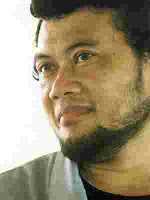Rhoma Irama (born December 11, 1946, in Tasikmalaya, West Java) is an Indonesian dangdut singer. During the height of his stardom in th 1970s, he became the self-proclaimed Raja Dangdut (King of Dangdut) with the group Soneta.
He was known as his stage name Oma Irama before he made a pilgrimage to Mecca and became a haji. He later took the name Rhoma Irama, which is an abbreviation of "Raden Haji Oma Irama" (Raden is an aristocracy title for Javanese and Sundanese cultures, but it is still unknown whether Rhoma Irama is a member of aristocrat class of Sundanese, which is known as his ethnic background).
Rhoma Irama is also well-known as an imam and is the chairman of the Muslim Forum (FUI), a nonpartisan religious organization. In 1992 he taught Cahyono, one of the Indonesian comedians according to his conversion to Islam. Once, Cahyono stated that Rhoma knew all of the Catholic principles as well as its mistakes.
Rhoma Irama was in the news in 2003 for his criticism of the suggestive dancing of fellow dangdut singer Inul Daratista. Recently, he was ineligible to receive the PhD award from the American University of Hawaii in February 2005 after being busted for plagiarizing his title.
In a comprehensive research about dangdut, a local journalist cited an allegation that Rhoma Irama may have stolen some of the tune of his songs from Indian movie theme songs. He also one of the artists on the only CD containing dangdut music in the United States, which was released on Smithsonian Folkways Recordings as part of its Indonesian music series.

Comments
Post a Comment